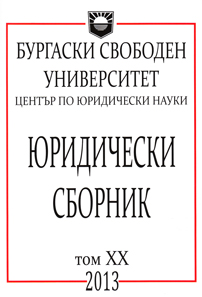ПОНЯТИЕТО „ИНТЕРЕС” В АДМИНИСТРАТИВНОТО ПРАВО И ПРОЦЕС
THE CONCEPT OF "INTERES" IN ADMINISTRATIVE LAW AND PROCESS
Author(s): Emilia KandevaSubject(s): Law, Constitution, Jurisprudence
Published by: Бургаски свободен университет
Summary/Abstract: In the administrative law and administrative process terminology, there exists a significant difference between the meaning of such terms as “lawful interest”, “legal interest”, “state interest”, and “public interest”. Legislation makes a definite distinction between these terms. “Lawful interest” refers to an interest, profit or gain which is recognized and protected by law. The “legal interest” arises when a certain right or interest is or may be infringed upon or violated. Legal interest refers to the relationship between the issued administrative act and the consequences which result or may result from it in a particular person’s legal environment. This relationship renders the person “concerned”, “affected” or “endangered”. The legal interest is a necessary prerequisite of the right of appeal of administrative acts before the superior administrative authorities and before the court. The terms “state interest” and “public interest” are the most prevalent considerations employed by the law and the administrative practice for the purpose of explaining, reasoning or justifying certain actions or measures of government authorities. The general and particular administrative laws and other regulations often use these terms as a basis for beginning certain procedures. In order to clarify the meaning and the standard intrinsic to the terms “state interest” and “public interest”, it would be necessary to address the issue of who determines the scope of the public and the state interest. Similarly to the state interest, public interest is determined not by the public but by the state, usually within the boundaries of administrative discretion. In the contemporary Bulgarian legislation, “public interest” is bound to three very important requirements: first, a strict normative regulation to ensure its application as a criterion; second, the need to present and implement it as a lawful legal purpose which serves as a guide for the government authority and at the same time as a protection for the rights of individuals; third, the “public interest” standard is to be employed only if the problem or the needs cannot be settled in any other lawful manner, i.e. the competencies for acting in the “public interest” should be regarded solely as exceptions.
Journal: Юридически сборник
- Issue Year: XVIII/2011
- Issue No: 1
- Page Range: 6-21
- Page Count: 15
- Language: Bulgarian

